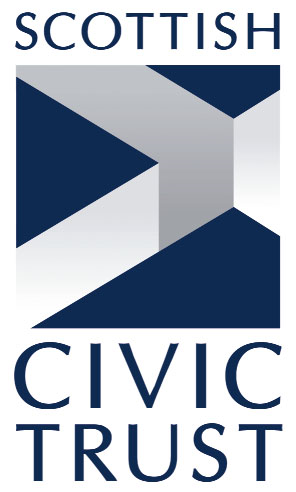Update Nov 2021: Strategy to Address Racism Against People of Colour
As part of our Strategy to Address Racism Against People of Colour, Scottish Civic Trust issues six-monthly updates on our anti-colour-based-racism work. This ensures that we are transparent about our progress and helps to sustain a sector-wide commitment to addressing racism against people of colour.
About the Strategy
In response to the worldwide Black Lives Matter protests of summer 2020, Scottish Civic Trust prepared a Strategy to Address Racism Against People of Colour.
The strategy considers our role in addressing racism against people of colour from three key perspectives:
- Redress: As an employer, how can we address racism against people of colour in our work practices and projects?
- Reinterpret: As the owner of the Tobacco Merchant’s House, how can we reinterpret our building’s history equitably?
- Support: As a national heritage charity giving advice to over 127 small trusts and charities across the country, how can we set an example for addressing racism against people of colour and what advice can we give to others trying to do the same?
Progress
In the past six months, we’ve completed the following actions outlined in the strategy:
- Compiled a database of BPOC groups that heritage organisations can contact about partnerships and co-creating projects.
- Supported BPOC groups to put on events for Doors Open Days 2021 in September. African and Caribbean Elders Scotland (ACES) delivered an intergenerational storytelling event to an international, online audience of 35 people. African Caribbean Women’s Association (ACWA) launched their new publication New Shoots Old Roots (Volume 2), to an international, online audience of 30 people. Both sessions were recorded and are being edited to be shared on Scottish Civic Trust, ACES and ACWA channels.
- Recruited a new Heritage Administration Officer using inclusive hiring practices. As specified in our strategy, we drafted a skills- and experience-based job description, posted the opportunity on diversity-specific job boards, avoided referral hiring and circulated the opportunity to BPOC organisations and equality networks and reviewed applicant CVs with photos, names, genders and dates removed. The system was successful in supporting a more diverse range of applicants to reach the final stages of appointment, with two of four candidates taken to interview being of a minority ethnicity.
- Submitted an application to Scotland’s Year of Stories events fund to work with BPOC communities on digital heritage projects. Unfortunately, this bid was unsuccessful.
- Contributed to a funding application submitted to the AHRC by Dr Richard Anderson of the University of Aberdeen for Aneath Aiberdeen: Slavery, Empire and Public History in North East Scotland. The project seeks to build capacity across Aberdeenshire in schools, community groups, and local history groups to explore and share the impact of slavery and the slave trade in their immediate locality.
- Applied for additional funding to support our Diverse Heritage programme.
- Explored grants and funding for the Tobacco Merchant’s House reinterpretation project.
- Began discussions with the West of Scotland Regional Equality Council and Scottish Refugee Council about involving young refugees in our My Place Photography Competition.
- Supported Empower Women for Change, an organisation that empowers diverse minority ethnic women through advancing their leadership and active citizenship in all aspects of life in Scotland and internationally, through our My Place Mentor programme. Our My Place Mentoring Officer is supporting them with strengthening their financial resilience, revisiting their strategic plans and mission, developing a strong case for support and identifying funders sympathetic to covering core costs for the organisation.
The recent progress we’ve made is in addition to the actions we completed previously:
- Organised a conference about race and heritage in Scotland.
- Compiled and released a Scottish heritage anti-colour-based-racism reading list.
- Created a dedicated anti-colour-based-racism section on the Scottish Civic Trust website.
- Collaborated with Heritage Open Days on an inclusive events toolkit, which includes tips for how heritage organisations can partner with marginalised groups to research and share their heritage. This was distributed widely throughout the 50 participant countries of the Council of Europe’s European Heritage Days programme.
- Participated in an Equalities and Diversity training session with the West of Scotland Regional Equality Council. All staff, our Director, our Chair and a few trustees were in attendance.
- Partnered with Thistles & Dandelions, a heritage knowledge, skills and confidence-development project for minority-ethnic women, to host a workshop to demystify architectural jargon that can be a barrier to engagement with the built environment.
- Attended the Roots Scotland community cafe at the West of Scotland Regional Equality Council, where our staff met with BPOC (Black people and people of colour) community groups. As a result of this meeting, our Mentoring programme will be working with two BPOC organisations (Thistles & Dandelions and African and Caribbean Elders in Scotland) to support their heritage projects. Our Diverse Heritage and Doors Open Days project officers also have follow-up meetings scheduled with the African and Caribbean Women’s Association and African and Carribean Elders in Scotland.
- Continued to support the Make Your Mark campaign, which aims to increase the number and diversity of heritage volunteers in Scotland, by contributing to the working group overseeing the campaign and line managing the campaign’s Communications Officer. The Communications Officer has produced an inclusive communications plan that will be adapted for public use, and has drafted a best practice for inclusive events.
- Drafted research and artwork briefs for the Tobacco Merchant’s House reinterpretation project.
The next actions outlined in the strategy are:
- Drafting an inclusive communications guide. Expected within the next year.
- Securing funding for the Tobacco Merchant’s House reinterpretation project. Expected within the next year.
- Hosting a placement from Next Step Initiative’s Sustainable Development Education Programme, which seeks to create more opportunities for Black, Asian and Minority Ethnic people to access and engage with the Scottish heritage sector. Expected within 2 years.
- Investigating the possibility of using Doors Open Days venues year-round as cheap or free venues for BPOC community groups’ events. We will aim to pilot this with a few venues and groups within 3 years, depending on interest and capacity.
- Working with partners to establish a forum or network in the Scottish heritage sector to discuss anti-colour-based-racism. We will aim to have this forum operational within 3 years, depending on interest and capacity.
Other aspects of the strategy that have not yet become relevant, but we still remain committed to doing are:
- Undertaking a robust investigation of any reports of colour-based racism in the workplace.


